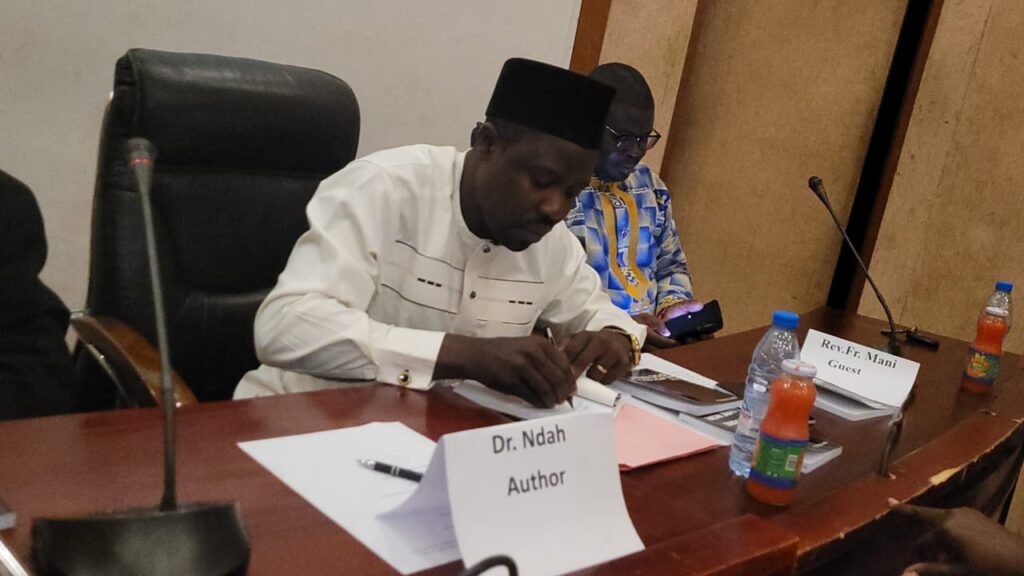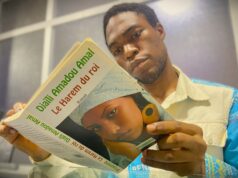
Cameroonian philosopher, educationist, and Pan-Africanist Dr. Ndah Grimbald has officially launched his landmark work titled The Black Book Doctrine: Redeeming the Notion and Primacy of Leadership. Blending historical analysis with philosophical advocacy, the book represents a bold intellectual effort to confront Africa’s leadership crisis and propose a new Afrocentric pathway forward. The 152 page book was innaugurated at the ST Muna Foundation in Yaoundé, last Friaday July 18, 2025.
Speaking during the ceremony, Dr. Grimbald emphasized that his inspiration came from Africa’s enduring sociological challenges. Poverty, underdevelopment, and high crime rates continue to plague the continent. These difficulties, he stated, prompted a personal journey of reflection and research into the root causes of Africa’s predicament. “Africa is confronted with multiple problems ranging from political, socio-economic, cultural, and social,” he observed, adding that he found it necessary to interrogate his own thinking and assumptions.
The contradiction between Africa’s historical position as the cradle of civilization and its current status as one of the least developed regions of the world served as a major intellectual stimulus. Despite being the supposed origin of humanity, Africa today suffers from what Dr. Ndah Grimbald calls “backwardness,” both in governance and in development. This paradox, he explained, led him to seek knowledge that could help resolve the continent’s many dilemmas. It became the foundation upon which The Black Book Doctrine was built.
As part of his intellectual preparation, Dr. Grimbald immersed himself in African history and political literature. Among the works he cited were The African Factbook, The African Origin of Civilization: Myth or Reality by Cheikh Anta Diop, and The Destruction of Black Civilization by Chancellor Williams. These books shaped his understanding of Africa’s precolonial strengths and postcolonial vulnerabilities. “From my findings I realized that Africa was indeed the birthplace of humanity,” he noted. “But today Africa is a laughing stock and so I decided to document my ideas into a doctrinal code.”
The result is a book rooted in the reclamation of African identity, leadership, and epistemology. Dr. Ndah Grimbald made it clear that the book’s central goal is to awaken and conscientize the African mind. “The main objective is to help decolonize the African mind so that Africa can come back to its original self,” he asserted. He further emphasized the need for Africans to shift from a westernized way of thinking to an Afrocentric approach that draws upon indigenous wisdom and cultural values.
One of the cultural concepts he highlighted is Ubuntu, a political and ethical philosophy that expresses the notion “I am because you are.” In Dr. Grimbald’s view, this communal ideology has been abandoned in favor of Western-style democracy that often neglects the collective good. The Black Book Doctrine seeks to reclaim such values and position them at the center of African political renewal.
The book also serves as a clarion call to action. Africans, he argued, must “come out from the shackles and the manacles” resulting from centuries of colonialism and neocolonialism. This metaphor of bondage is central to the book’s framework. Liberation, as presented by Dr. Ndah Grimbald, involves not just political independence, but mental emancipation and intellectual courage. He urged Africans to impose themselves confidently in international politics, global economic systems, and cultural spheres.
Dr. Ndah Grimbald sees this moment as particularly opportune for Cameroon. After 65 years of independence, the country, like many others across the continent, remains trapped in postcolonial dilemmas. However, he pointed to the growing consciousness among African youth, particularly in Cameroon, around the ideals of Pan-Africanism. This rising awareness, he argued, reflects a turning point: one that no longer tolerates imported political paradigms and shallow democracy.
According to Dr. Ndah Grimbald, the political establishment must take note. Presidential candidates and party leaders preparing for future elections in Cameroon should understand that the Pan-African message is not just a trend, it is now a requirement. “Without the Pan-African ideal, it will be very difficult for peace to be obtained in Africa,” he said. He called on political actors to draw inspiration from the book and embrace its teachings as they shape public policy and governance strategies.
He ended the ceremony with a powerful reflection: “This book is out there to address very critical leadership problems we have in Cameroon and throughout Africa,” he stated. “I hope that politicians, policy makers, economists, as well as researchers will draw the necessary inspiration to provide the kind of leadership we have been clamouring for.”
In a time of growing uncertainty and unrest, The Black Book Doctrine offers a bold and timely intervention. It calls for a reawakening rooted not in nostalgia, but in responsibility and vision. It reminds Africans not only of who they are but of what they can become, if they reclaim the power to lead themselves.










